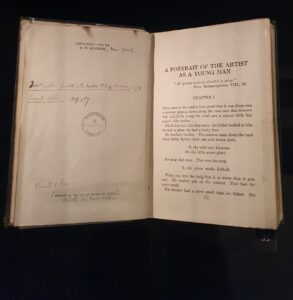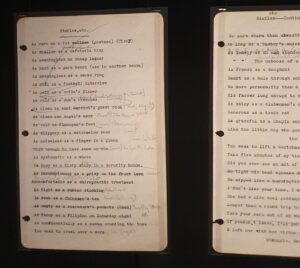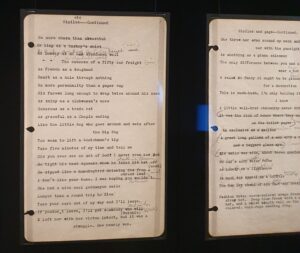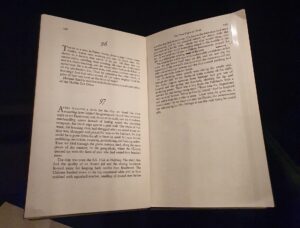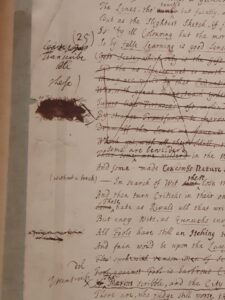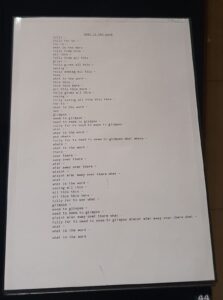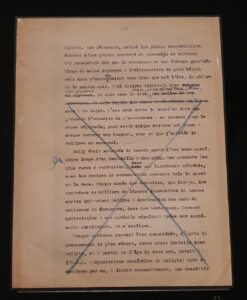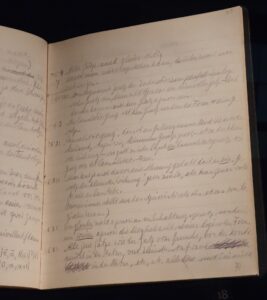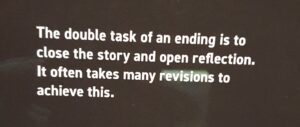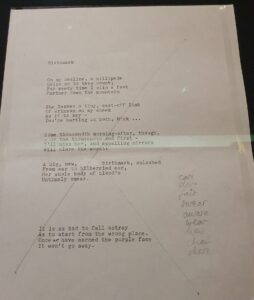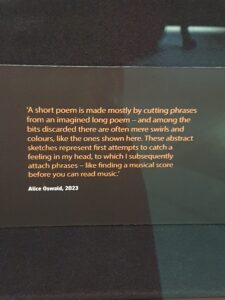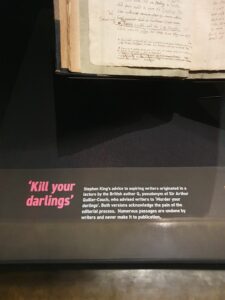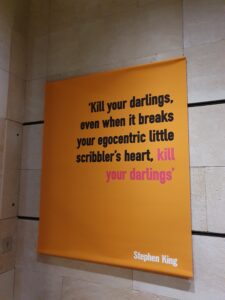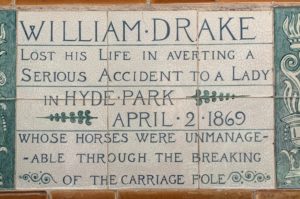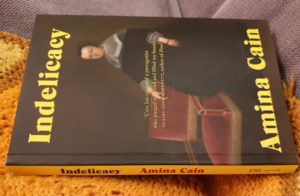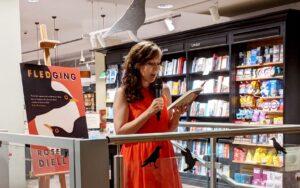
My US launch event last night brought back lots of memories from the UK launch last year.
The two events were a bit different: the UK launch was a bit more of a party, with many more family and friends from my network in London. I didn’t want a formal Q&A, and instead my publisher and I gave speeches.
For NYC a formal Q&A felt more appropriate, but it meant I didn’t get the chance to say all my thank yous.
So here you go – my speech from last year, for those who missed it. And now I can add thanks to Book Club Bar and Ilana Kaplan, and also to my cousin Nora for her amazing bag-stuffing and egg-design skills, plus very comfy air mattress.
UK Launch Speech, August 2024
In April 2021, I wrote an email to my writing circle, the Southbank Scribblers. This is what it said:
“Right, I’m just taking a deep breath and sending this before I change my mind! Apologies in advance for the gore and anatomical descriptions. This is the opening of the novella I’ve been thinking about. I can’t decide whether to keep going as I can’t decide if it’s a great idea or an awful one. Cue the jury! Won’t provide any further info at this stage as don’t want to influence your reactions…. See you on Monday!”
I had started writing a novella inspired by a topic that had been something of an obsession of mine for a few years. A topic that seemed to come up in almost every deep conversation I was having with female friends at the time.
People have asked me if Fledging is auto-biographical. Well, given what happens in the first scene I’d be worried if it were.
But it is about a woman in her mid-thirties obsessing about whether or not she wants to have kids. Reader, I, too, have been a woman in her thirties obsessing about whether or not she wants to have kids.
I confess that occasionally, that woman even re-emerges. Except now she’s closer in age to Lia than when I first started writing Fledging.
After a while, through the conversations I was having with friends, I realised that as much as the outcome was important, what really struck me was the all-consuming nature of the decision itself. How we couldn’t escape it. How it affected so many other decisions in our lives. How I was tired of thinking about it. How my biggest fear was of choosing the wrong thing.
There’s a line in Fledging – “Choices are gifts; a luxury few can afford. But hidden beneath their shiny wrapping lie responsibility and regret.”
So as much as I wanted this novel to explore how it felt to be different, to not want what everyone else wants, I also wanted it to explore the burden of the decision itself. How it feels to be a woman hearing her fertility is running out.
Men face the baby question too, but it’s particularly acute for women. Men joke that dating women in their thirties is a nightmare because they’ve got “baby fever.” Those men are being insensitive. They have something those women don’t have.
Time.
I wrote this book as therapy. But also because I wanted to challenge the default. To challenge the idea that there are things people can say to you that you can’t say back to them. That others know best. That women (and indeed men) without children aren’t capable of making their own decisions.
So Fledging is dedicated to…
All those who want children, but can’t have them
Who don’t want them, but don’t have the privilege of choice
But most of all to those who need to see themselves in its pages
I hope you do.
I’ve talked a lot about decisions tonight. Those who know me well already know that decisions aren’t my forte. Put me in front of a long restaurant menu and I’ll have a breakdown. I was so torn on the baby question I wrote an entire novel about it.
But one thing I’ve always been sure of, for as long as I can remember, is that I wanted to be a writer. Some dear friends said to me ‘tonight is basically your baby shower’ – I replied ‘actually, it’s my wedding!’ – and I was only half joking, because the truth is I chose not to have a wedding, but I have been dreaming of this day since I was a little girl.
So before I read from Fledging I do want to take a moment to recognise those who have helped me to get here.
First, thank you to Will. I’ve really seen the joys of working with a small press with Renard. I can’t count the number of emails back and forth, and the collaboration on the BEAUTIFUL cover, goodie bags, postcards, invitations, gifs has been fantastic. Renard Press has only been around for a short time but Will has already achieved huge things. I’m honoured he chose Fledging.
I want to thank Laetitia, my agent, for taking a chance on Fledging too. I was lucky to have two agents make me offers but I chose Laetitia because I felt that she really understood my vision for Fledging, and her editorial suggestions resonated. They made Fledging a better book, and the book it is today. I’ve already seen things picked up in reviews which are in there because of her feedback. Thank you.
I have to give a huge shout out to Damien at Indie Novella for his editorial support too – this book has been on a real journey. He made me believe in it, and introduced me to Laetitia. Indie Novella is an amazing initiative supporting new authors. Writers, I highly recommend you look them up.
Now I must mention the Southbank Scribblers, Matt and Pippa.
I can’t believe it’s five years since we took that course at City Lit and started our writing circle – now a triangle – together. Thank you for responding so positively to that email in April 2021. Thank you for the exercises and the critiques – you’ve made me a better writer and I wouldn’t be here without you. And I’m sure it won’t be long until our roles are reversed and it’s me listening to you stand here and talk about your beautiful, moving novels.
To my friends and family, who’ve supported me and cheered me on. Some of you are named in the acknowledgments, others know who you are. Thank you for knowing what this means to me and thank you for celebrating it as you have.
Thank you to my parents, who’ve interrupted their holiday to be here. Special thanks to my mum, for her editorial support. She’s been my most dedicated editor for years now and I’m confident she could have a new side hustle if she ever wanted to charge anyone for her services. My love for both my parents is in this book; my Dad, through Sicily, and my Mum – well I think you can work that out.
Special thanks to Martine, my mother in law, who so generously helped make tonight possible – and brought a whole delegation with her. Your enthusiasm means so much to me.
Thank you to Giles. I woke up this morning to the best of my reviews stuck to the bathroom mirror, and tiny bird figurines scattered all around the house. I won’t say any more.
To those who’ve literally gone the extra mile and travelled from far and wide to be here – in addition to my parents, special mentions go to Aslak, Cecilie, Ane, the other Cecilia, Shelley, Elizabeth and to Nicole. Nicole Louie and I met online a few years ago, and I’m so excited to be planning joint events with her.
Finally, thank you to the staff at Waterstones for hosting us this evening, and all the friends and family who’ve helped make tonight a success – whether on the welcome desk, handing out goodie bags, or as head of PR.
And a special shout out to every person who showed up who’s never set eyes on me in their life – including the Childfree Book Club, the 30-45 ladies book club, the Putney Book Club, the Bedford contingent, and fellow Renard authors. I hope you’ve felt welcome tonight!
I’ll now read from the opening of Fledging. I think it’s probably the part of the book that has changed the least since I wrote it, because, just as happens in the scene, it came from somewhere deep inside of me.
And as I said in that email of 2021, apologies in advance for the gore and anatomical descriptions….
 Last week I visited ‘Write, Cut, Rewrite’ at the Bodleian Library in Oxford. Sadly I caught it on the last day, and not everyone can just pop over to Oxford on the train anyway, so for those who missed it here are some reflections from this fascinating exhibit about the authorial editing process. There’s also a book you can order online which goes into the exhibit and more.
Last week I visited ‘Write, Cut, Rewrite’ at the Bodleian Library in Oxford. Sadly I caught it on the last day, and not everyone can just pop over to Oxford on the train anyway, so for those who missed it here are some reflections from this fascinating exhibit about the authorial editing process. There’s also a book you can order online which goes into the exhibit and more.